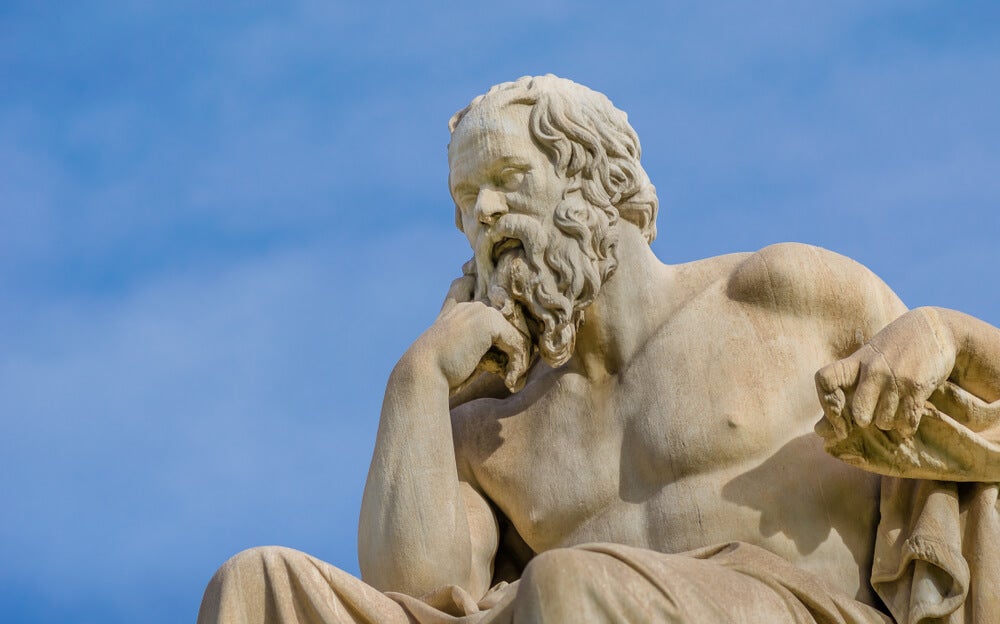Socrates, considered the father of philosophy, was born in Athens in 469 BC. His father, Sofronisco, was a bricklayer and his mother Fainarete was a parter. Despite their humble origins, many of Socrates’ life lessons survive today.
This great philosopher lived like any other Athenian, followed his father’s profession for a time and had to serve as a soldier of the Greeks, he was a man known to be a great worker, the first lessons of his father’s life relate to his patience and his ability to cope with the pressures of his condition.
- When he began to become famous as a thinker and naturalist.
- He made many enemies.
- Since he promoted an implacable ethic.
- In which there was no room for standards of dishonesty.
- Dishonor or double morality.
- For which he was persecuted.
- Ridiculed and condemned.
- Die / commit suicide.
- This last episode ended up becoming one of the great lessons of Socrates’ life.
“The souls of all men are immortal, but the souls of the righteous are immortal and divine. “Socrates?
Socrates wasn’t physically handsome. He was small and his belly was very prominent, his features were hesical and among them were the big bulging eyes and extremely flat nose, his physical appearance has been the subject of jokes by other philosophers.
None of this, however, affected the “father of philosophy. “Rather, he paid little or no attention to those comments. He always wore the same cape and was totally austere in his lifestyle. He just ate and drank the essentials. Anfitcao said no slave would want to be treated like him. Plato, for his part, washed his feet and put his sandals on.
One of the most interesting aspects of the life of this philosopher is that he never wrote, although everyone considers him a very superior and wise spirit, all the teachings of Socrates were oral, the reason why he adopted this behavior is another of the great lessons life of Socrates.
He said that everyone should develop their own ideas, that if they wrote it would condition the intellectual construction of others. It was very real: he talked to people, he put at stake his irony and his extraordinary ability to see things from another angle.
The method by which Socrates passed on his teachings was so subtle and intelligent that it is still used today (yes, less than we would like). The great pedagogues, such as Jean Piaget, were inspired by the Socratic method, known as “Maiutica”.
The philosopher began a conversation by questioning his interlocutor, asked questions that led the interlocutor to know whether what he was saying was coherent or not, in this way everyone has come to the truth for themselves, Socrates listened and merely questioned.
Socrates is the author of the famous phrase “I just know I don’t know anything. “In your case, it wasn’t a slogan or a way to promote yourself. In fact, this philosopher had a unique mental openness. His main resource in recognizing the truth was to believe that he did not know what the truth was, to ask questions before trying to find answers, to expand the worldview before defining it.
Socrates was also the author of the famous statement: “Do you know yourself?”This phrase was inscribed in front of the temple of Delphes. No sought to define the human being, but invited us to explore in ourselves. exciting journey.
The most famous of the Athenian philosophers also had a great sense of humor. His good humour is reflected in his games with Xantipa, his wife. She was 30 years younger than him and was famous because she was an argument and a pendent. Socrates was once asked why he had married her and he replied: “I like to learn every day from a person with such a difficult personality. Isn’t there a better school than dealing with others?”
However, when he was sentenced to death, his wife went to visit him and began to cry. Socrates then said to him, “Don’t cry, we’re all condemned to death by nature. “His wife replied, “But they unjustly “to this, Socrates answered, “Would it be less regrettable if I had been convicted?”
These are just some of the great lessons in the life of Socrates, one of the most important philosophers in history, who until his death sentence accepted and fulfilled with the serenity of one who made his life an eternal fact.

